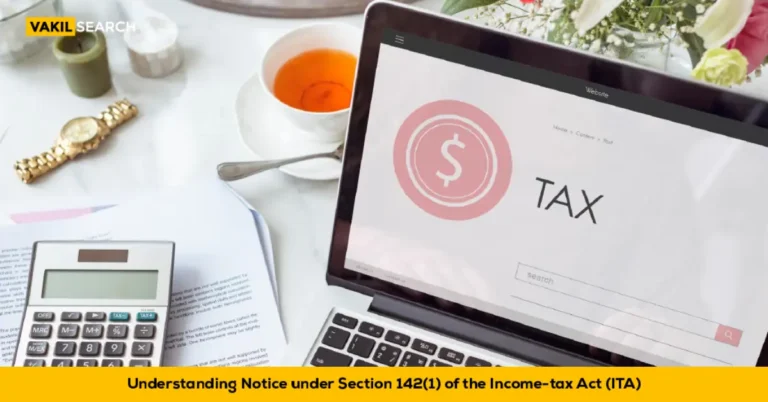There are seven types of income tax return forms. ITR 1, ITR 2, ITR 3, ITR 4 till ITR 7. Know the eligibility criteria right now!
What Are The Different Types Of Income Tax Return Forms In India: An income tax return is a form used to file the taxes to the Income Tax Department. In maximum cases, the tax return is a worksheet with predefined parameters that aid in calculating your income tax liability based on your earnings.
The law requires every individual and businessman to file income tax returns for each fiscal year. A report is necessary for every income, be it a salary, capital gains, dividends, interests, or other sources. If your Income Tax Return shows that you paid more than your liability, you may request a refund of the excess tax. However, such rebates are subject to the Income Tax Department’s calculations.
Different Forms Of Income Tax Return Forms
There are seven types of ITR forms. These are categorized as follows:
-
ITR 1
This form is helpful for those people whose income source is from a salary or a pension. Furthermore, if you have income from house property or other sources, excluding lottery winnings or horse racing income, you must file this Income Tax Return form. You cannot use this form if your annual income exceeds INR 50 lakh or if you own foreign assets. Furthermore, the record cannot report taxable capital gains, income from multiple properties, agricultural income above ₹5,000, or earnings from a business or profession.
-
ITR 2
If your annual income is from house property, salary, pension, or other sources, and if it exceeds INR 50 lakh, you must use this form to file your IT Return. If you combine your spouse’s or children’s income with your annual income, you must file Form 2 with ₹1. However, if your payment includes earnings from a profession or business, you should not use this form.
-
ITR 3
Individuals who earn a living from a profession or business are eligible to file income on Form 3. ITR 3 form is also helpful if your earnings include pension, salary, or other sources of income.
-
ITR 4
If you choose the presumptive income scheme under sections 44AD, 44ADA, or 44AE, you must file your Income Tax Return using form 4. If your total annual turnover exceeds ₹2 crore, you must file your income tax using Form 3.
-
ITR 5
Form 5 is helpful for limited liability partnerships (LLPs), bodies of individuals (BOIs), and associations of persons to file income taxes (AOPs).
-
ITR 6
Companies not excluded under Section 11, which provides guidelines for income from property held for religious or charitable purposes, must file Form 6 electronically.
-
ITR 7
Individuals and businesses who are required to file income tax returns under sections 139 (4A), 139 (4B), 139 (4C), and 139 (4D) must use Form 7. You can easily file your Income tax return forms online, also known as e-filing, which simplifies, expedites, and eliminates the need for paper.
Eligibility and Ineligibility for Each Income Tax Return Filing
Who is Eligible for ITR-1?
- A person who earns a living through a salary or a pension
- An individual whose income is dependent on a single piece of real estate
- A person who receives no income from capital gains or other sources
- An individual does not own any foreign assets and does not earn any foreign income.
- A person with an agricultural income of up to ₹5000
- A person who has additional sources of income such as other investments, fixed deposits, and so on
- Any person who does not have any income from winning lotteries, horse racing, or other windfalls
- Individuals who want to combine their income with their spouses or minor children.
Our income tax calculator ay 2023-24 ensures you stay compliant. Calculate your taxes easily with our calculate income tax online tool.
Who is not Eligible for ITR-1?
- One with a salary of more than ₹50 lakhs
- Individuals with an agricultural income of more than ₹5000
- Applicants with capital gains and business income
- If a person earns a living from multiple house properties
- If a person is a corporate director, he cannot apply for ITR 1
- This form is not available to anyone who invests in unlisted equity shares during the fiscal year
- Owners of foreign assets who are residents and earn income from abroad
- A person liable for another person’s income cannot use Income tax return forms for ITR filing
- Tax deduction occurs in this case in terms of the other person.
Who is Eligible for ITR- 2?
- Individuals who earn a living through a salary or a pension are eligible to use this Income Tax Return filing
- An individual who earns from capital gains, i.e., the sale of an asset or property
- Owner of foreign assets and one whose primary source of income is outside of India
- A person who earns more than ₹5000 from agriculture
- People who make a living by winning the lottery, for example
- If a person is a company’s director
- RNORs and non-residents.
Who is not Eligible for ITR- 2?
- All taxpayers should not use this form for income tax returns. For your convenience, we have classified such people in the following section
- Individuals whose total income includes profits or gains from a business venture or other profession are ineligible for Income tax return forms
- Those with a total income of less than ₹50 lakhs.
Who is Eligible for ITR- 3?
- Profits from unlisted equity investments
- Individuals who are continuing in their business or profession are eligible
- Director of the company
- Income from a house, a pension, a salary, or other sources
- A person who earns money as a partner in a company is eligible to use this ITR
Who is not Eligible for ITR- 3?
- Any person with a business turnover of less than ₹2 crores
- If the taxable income from the business is in the Income tax return forms of salary, bonus, commission, remuneration, or interest, taxpayers can file Income Tax Return 3. Aside from this, any other source of business income is ineligible.
Who is Eligible for ITR- 4?
- Individuals who make a living through their businesses
- One who owns a single house and earns a living from it
- Taxpayers who do not earn income from capital gains or asset sales
- If a person’s agricultural income is less than ₹5000, he can file ITR 4
- Individuals who do not own property or assets outside of India
Who is not Eligible for ITR- 4?
- Those who own a foreign asset
- Company executives
- A person who earns money in a foreign country
- A taxpayer’s total income exceeds ₹50 lakhs
- If an applicant carries forward a loss under any income category, he is not eligible to use this ITR
- Unlisted equity share investors
- A non-resident and a resident who is not normally a resident
- Individuals who earn a living from more than one rental property
- Having the ability to sign on to any account outside of India
- This Income tax return forms is not available to Limited Liability Partnerships (LLPs).
Who is Eligible for ITR-5?
- Limited Liability Partnerships (Limited Liability Partnerships)
- Local governments
- BOI (Body of Individuals)
- Artificial judicial figures
- Firms
- AOPs are procedures (Association of Persons)
- The deceased’s estate is insolvent
- Investing funds
- Business trusts
- Bodies that are unable to choose this Income tax return forms
Who is Ineligible for ITR-5?
- Any individual who files an IT Return 1
- Families Undivided in Hinduism (HUFs)
- Any business
- This form cannot be filed by those who file ITR 7
- Applicants with capital gains income.
Who is Eligible for ITR- 6?
- Except for those claiming exemption under Section 11, all companies
- Earned income from real estate
- Profits from a business
- Income from a variety of sources.
Who is Ineligible for ITR- 6?
- Section 11 organizations can claim tax exemptions because they use this income for religious or charitable purposes
- Income derived from capital gains
- Individuals or HUFs.
Who is Eligible for ITR-7?
- As previously stated, companies doing ITR filing under the sections above are eligible to file ITR 7
- Section 139(4A): Individuals who earn their income from trust properties or other total legal obligations for charitable or religious purposes must do ITR filing using this Income tax return forms under this Section
- Section 139(4B): Political parties must file returns under this Section if their total earned income exceeds the non-taxable limit
- Section 139(4C): The following organizations must file returns under this Section using the ITR 7 form
- The news agency
- Institutions covered by Section 10 (23A)
- Association for Scientific Research
- Section 10 associations or institutions (23B)
- Section 139(4D): Returns that colleges, universities, and other institutions must file under this Section. However, under other provisions of section 139, they are not required to provide a return of income and losses (4D)
- Section 139(4E): Business trusts file returns without providing income or loss statements
- Section 139(4F): Investment funds will file returns under this section following section 115UB. It is not necessary to present income or loss returns when filing IT returns under any provision of this section.
Who is not Eligible for ITR-7?
- ITR 1 applies to any salaried individual or HUF
- Those who qualify for ITR 5 Tax Rate are not eligible to file IT returns using ITR 7
- Furthermore, the finance ministry has extended the deadline for filing ITR to May 31, 2021. As a result, taxpayers who plan to file: https://www.incometaxindia.gov.in/Pages/tax-services/file-income-tax-return.aspx tax returns must understand the Income tax return forms 1 filing last date through 7.










